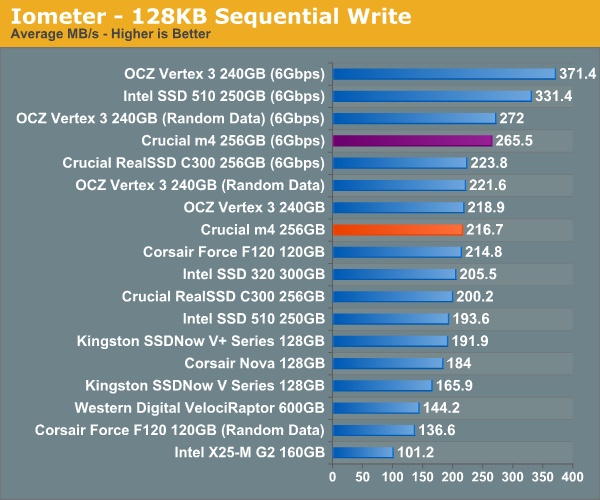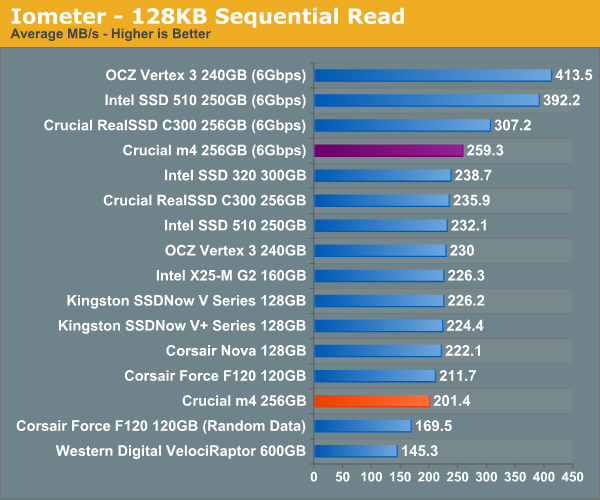The Crucial m4 (Micron C400) SSD Review
by Anand Lal Shimpi on March 31, 2011 3:16 AM ESTSequential Read/Write Speed
To measure sequential performance I ran a 1 minute long 128KB sequential test over the entire span of the drive at a queue depth of 1. The results reported are in average MB/s over the entire test length.

Sequential write performance at low queue depths is good, but not quite as high as the 510 or Vertex 3

Sequential read speed is definitely down from the C300, despite Crucial's claim that random read performance was sacrificed to improve sequential read performance. The m4 so far appears to have better write performance at the sacrifice of read speed. There's much more than meets the eye, let's dig deeper.










103 Comments
View All Comments
casteve - Thursday, March 31, 2011 - link
+1The biggest problem is SSD mfgrs push the high capacity drives out for review to show their products in the best possible light rather than the (more mainstream) boot drive-sized SSDs.
Anand, here's hoping you will fill these charts in with more 64GB and 128GB reviews. I don't care about 256GB performance.
Anand Lal Shimpi - Thursday, March 31, 2011 - link
I always request the smaller capacity drives. Launch reviews tend to feature the big ones but I try my best to fill in the smaller ones as time goes on.ckevin1 - Friday, April 1, 2011 - link
Speaking of drive size disparities -- why is the Corsair F120 on these charts, instead of the F240?We don't have a comparison to any of the top performing SF1200 drives.
sticks435 - Thursday, March 31, 2011 - link
++1. Especially when building something like a gaming PC, where because of the stream of console ports, you can build a screaming system for $1000 or so. Not spending half my budget on a SSD.JNo - Friday, April 1, 2011 - link
+1 for smaller drive figuresiamezza - Friday, April 1, 2011 - link
+1 for price/GB, reliabilitycknobman - Thursday, March 31, 2011 - link
Id say for anyone still rocking a SATA II interface (like me with my notebook) Intel 320 series is the clear winner now.I was leaning towards an OCZ Vertex 2 Sandforce 1200 series drive but I read too many horror stories of OCZ's reliability.
Intels new 320 series looks to be pretty solid and fast.
Martimus - Thursday, March 31, 2011 - link
Many people on our forums are having an issue with stuttering on the C300 drive (seen here: http://forums.anandtech.com/showthread.php?t=21398...It is accompanied with the error:"The device, \Device\Ide\iaStor0, did not respond within the timeout period."
Does the C400 have this same issue? All the people who have reported the problem are using P67 chipset motherboards.
adamantinepiggy - Thursday, March 31, 2011 - link
I believe I ran into stuttering issues with the p67 chipset, i2600k Win7-64 and C400 with release firmware using the last two Intel SATA port drivers (9.xx and 10.xx). It manifested itself with odd PCMark Vantage HHD suite results. Basically, running the tests would incur a "0" result in one or more tests like the gaming part. In about 10 runs of the Vantage HDD suite test, over 2/3 would fail because of this. When it did complete, it would only return about 45,000 marks. Perplexed on this behavior, I changed driver for the SATA port to the stock MSAHCI (via upgrade driver in device manager) and the problem went away to where I was getting consistant 57000ish marks on this test.To see if I could replicate this issue, I again changed the SATA port driver back to the same latest Intel 10.xx SATA port driver (again via device manager) and the problem never returned. With the now-working Intel driver/c400 interface, PCMark Vantage HDD Suite now gives us 64000+ on an empty 256GB C400. This was done on an original ASUS and MSI bugged-P67 chipset (SATA2 3G/s port fail bug, however I only use the Intel SATA3 6G/s ports for testing so have not returned them).
No I don't know why it occurs or if it affects all of the P67 MB's when used with the C400's. While it interests me in figuring out why, I only have so many work-hours a day to do things and my misson in that particular case was was to make a stable P67 platform for benchmark testing (which I accomplished), not determine root causes for things I could get around (weird bugs). Unfortunately (or maybe fortunately :-), I am not an engineer, I am the merely the resident tech hardware enthusiast who actually makes the stuff work for the real engineers.. This MSI P67-GD65 motherboard continues to be the standard benchmark machine for Micron R&D test results until I can get the time to order a post-bug fix replacement.
A interesting FYI: is that this MSI P67-GD65 motherboard consistently outperforms the ASUS P8P67 by about 2-4% in disk i/o at "stock" CPU speeds (we don't overclock bench machines, but from a "I-like-to-play-with-stuff" perspective, the ASUS overclocks much better/easier!).
jimhsu - Thursday, March 31, 2011 - link
If you are using the C300 with Intel RST 9.x or 10.x, there is a specific fix:http://forums.crucial.com/t5/Solid-State-Drives-SS...
The problem has been solved for all the responders on the thread including me.